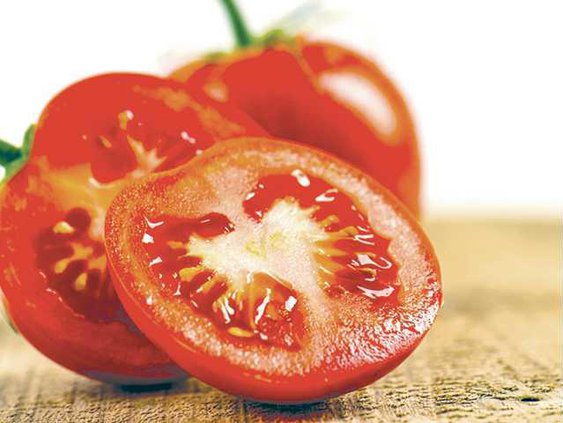In 1978, the low-budget science-fiction film “Attack of the Killer Tomatoes” was a hit among young moviegoers. The film was a spoof on the horror and sci-fi genre movies of that time and featured monstrous tomatoes revolting against humans, killing them off one by one.
Today, however, tomatoes are highly regarded in helping humans in battling a barrage of diseases. Prostate and breast cancer, surprisingly, top the list.
Research indicates that tomatoes contain lycopene, which scientists consider to be a strong antioxidant.
“Several studies have shown that a diet high in fruits, vegetables, soy, fiber, lycopene — which you find in tomatoes — and the omega-3 fatty acids reduces the risk of both breast cancer and prostate cancer,” Dr. Dean Ornish, a clinical professor of medicine at the University of California San Francisco, reported when speaking about the benefits of a more plant-based diet while in Savannah in November. “These diets contain a lot of naturally occurring antioxidants that, combined with physical activity, have been shown to reduce what is called oxidative stress.”
Ornish has spent decades researching the benefits of lifestyle changes, including a plant-based diet rich in foods that contain lycopene and other antioxidants, in reducing or completely eliminating chronic illnesses.
Dr. Edward Giovannucci, a professor of nutrition and epidemiology at Harvard University’s T.H. Chan School of Public Health, said the lycopene found in tomatoes and other fruits and vegetables is a carotenoid, a family of pigments that give fruits and vegetables their bright red, orange and yellow coloring.
In 2002, Giovannucci published his research findings in the Journal of the National Cancer Institute confirming that frequent tomato or lycopene intake was associated with a reduced risk of prostate cancer. His research also found that lycopene intake was associated with a reduced risk of prostate cancer and that intake of tomato sauce, the primary source of bioavailable lycopene, was associated with an even greater reduction in prostate cancer risk.
More recently, a team of Finnish researchers published a report in the journal Neurology stating that lycopene decreases the risk of stroke in men. The report was published in October 2012 and was based on research following more than 1,000 men over a period of 12 years.
Dr. Andrew Weil is an American physician, teacher and author on holistic health and the founder and director of the Arizona Center for Integrative Medicine at the University of Arizona. He spoke at the November lecture in Savannah. Weil reported that research shows lycopene may help prevent heart disease, atherosclerosis and breast and prostate cancers. He said it also may be the most powerful carotenoid against singlet oxygen, a highly reactive oxygen molecule and a primary cause of premature skin aging.
Samantha Heller, a registered dietitian and frequent contributor to “The Dr. Oz Show,” said lycopene also is found in pink grapefruit, watermelon and guava. She agrees that it helps with premature skin aging and helps reduce the risk of sunburn.
“It helps protect the skin against the ultraviolet rays that cause sunburn and premature aging,” she reported on doctoroz.com, adding that folks should still apply sunscreen.
Weil noted that despite being red, strawberries and cherries do not contain lycopene. It is found in watermelons and other fruits and vegetables, he said, just not in the amount found in tomatoes.
Like Giovannucci, Weil said the cooking process makes the lycopene more bio-available and accounts for 85 percent of how Americans take in lycopene in their diets.
Giovannucci recommends at least 10 milligrams of lycopene per day and said that because lycopene is a fat-soluble nutrient, it is best taken when combined with some form of healthy fat.
For example, he reported that when cooking a tomato sauce, adding a little oil adds flavor and the fat needed for the lycopene to be absorbed in the body. He added that getting the recommended amount is not that difficult. A one-cup can of pure tomato juice contains 21,960 micrograms — nearly 22 milligrams — of lycopene.
Tomatoes on attack against cancer


Sign up for our e-newsletters